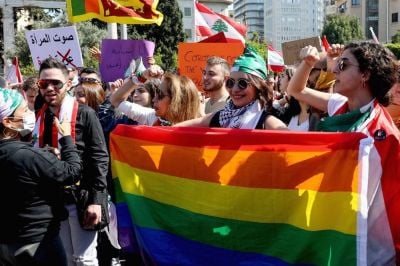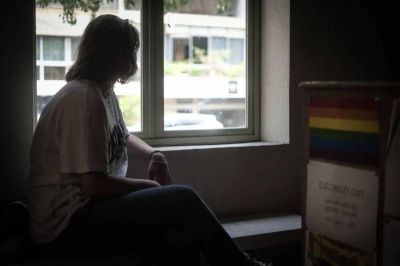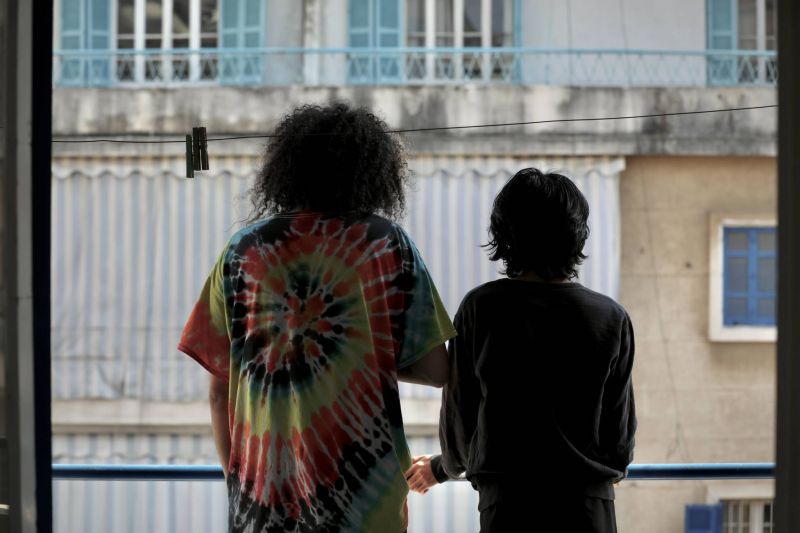
Ryan and Andy in their apartment in Beirut. (Credit: Matthieu Karam/L'Orient-Le Jour)
Ryan, 19, and Andy, 20, share their journey from Iraq to Beirut, where they seek temporary refuge after narrowly escaping danger— highlighting the discrimination they have faced as members of the LGBTQ+ community in their country.
Having grown up in Najaf, a religious town in the country’s south, Ryan experienced an environment that could be described as highly restrictive.
“My father serves as a policeman, and my family has ties to the local armed militia while remaining deeply connected to our tribe,” Ryan says. “That’s precisely why fleeing from them put my life at risk. Defying your own family is an unimaginable act.”
To come out is to ‘sign your death warrant’
From a young age, the young Iraqi felt an undeniable attraction to men but pushed away the feeling that contradicted his religious upbringing.
Just as his parents were considering enrolling him in a religious school to become a sheikh, the Internet entered his life, transforming his perspective entirely.
He delved into numerous religious texts that rattled his convictions. He always made sure to erase the browsing history on the family computer.
The more websites he explored, the more Ryan embraced atheism. Despite his careful measures, his father’s suspicions intensified.
“He began to question my sexuality and worry about the rumors circulating about me,” Ryan recounted. “But I did not come out, which would have been like signing my death warrant.”
Human Rights Watch (HRW) released a report in March 2022 titled "Everyone Wants Me Dead," which exposes the grim reality faced by LGBTQ+ individuals in Iraq. The report paints a distressing picture of kidnapping, rape, extortion, and even brutal murders inflicted upon them by armed groups, based on chilling firsthand accounts.
Although Iraqi legislation does not explicitly criminalize homosexuality, LGBTQ+ individuals often find themselves detained under vague legal grounds like “morality” or “incitement to debauchery.” Unfortunately, the perpetrators of homophobic violence remain immune to prosecution, perpetuating a culture of impunity.
Ryan swiftly understood the importance of keeping a low profile, discreetly altering his attire on the outskirts of his neighborhood to evade unwanted attention.
Having grown up during the war years in the post-Saddam Hussein war era that commenced in 2003, he possesses a clear understanding of the nature of Iraqi militias.
Reflecting on the years marred by sectarian conflict from 2005 to 2008, Ryan recalled the Mahdi Army led by Moqtada Sadr—a militia responsible for mercilessly executing numerous LGBTQ+ individuals with impunity — often resorting to stoning as their chosen method.
“These victims, labeled as 'emo' due to their distinctive clothing and long hair, were perceived as a threat to Iraqi religious principles and cultural values,” Ryan said.
Killed for their long hair
The war was over but the violence against LGBTQ+ individuals, or those perceived to be LGBTQ+, persisted.
Ryan vividly remembers witnessing with his parents a person being stoned to death near his home in Najaf, because of their “emo” appearance.
“The adults in his family insisted that my cousins and I change their clothes and get haircuts to avoid becoming targets and getting killed,” Ryan said.
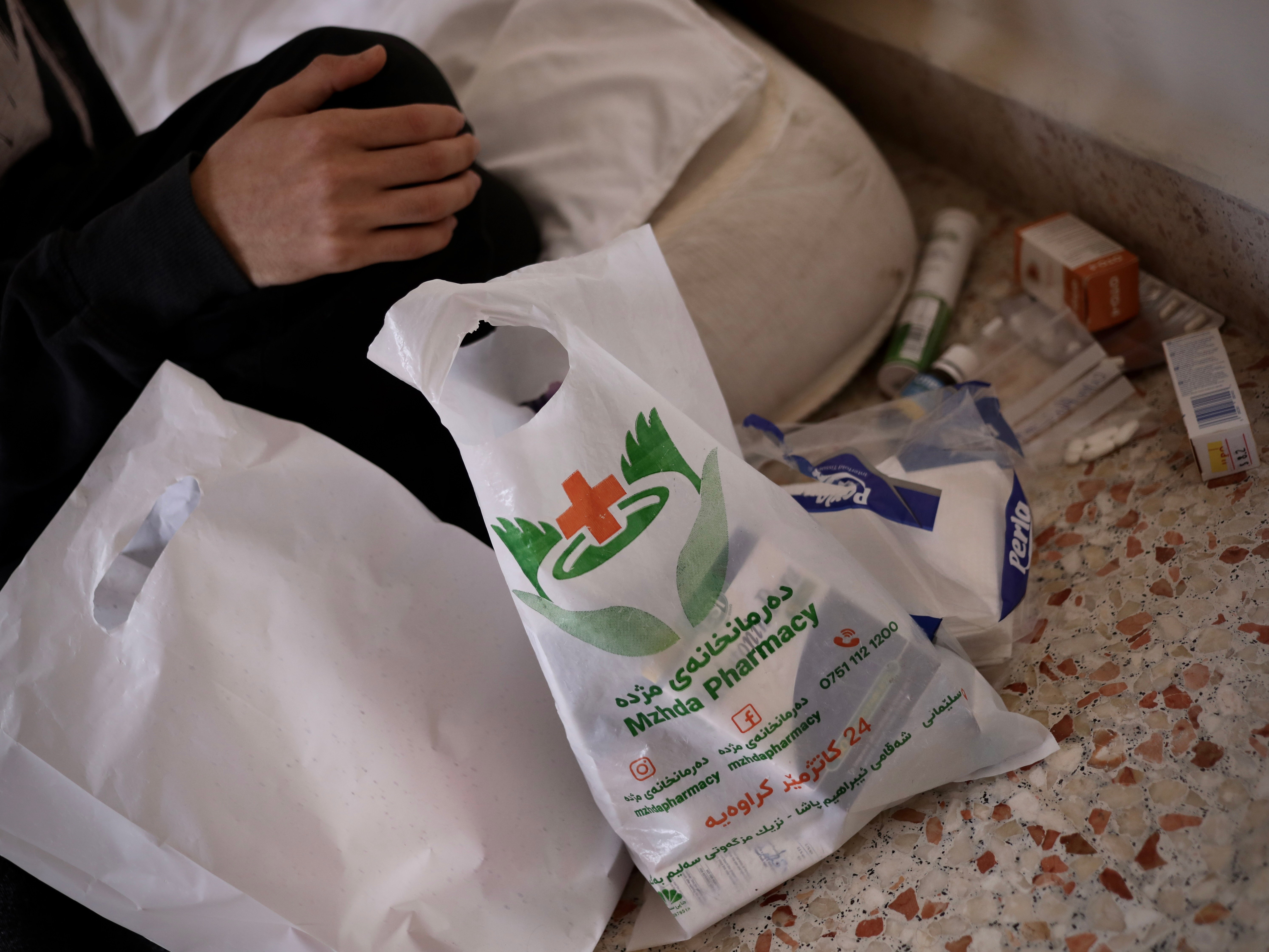 Ryan and Andy show off the depression medication they got with help from an NGO in Lebanon. (Credit: Matthieu Karam/L'Orient-Le Jour)
Ryan and Andy show off the depression medication they got with help from an NGO in Lebanon. (Credit: Matthieu Karam/L'Orient-Le Jour)
Years later, when Ryan co-founded Gala Iraq, an NGO that assists LGBTQ+ Iraqis, he received numerous death threats accompanied by photos or videos of stoning, threatening him with the same fate.
This climate of homophobic violence affected not only its direct victims but also claimed collateral victims. In 2017, Karar Nushi, a young actor, was tortured and fatally stabbed simply for preparing for a beauty contest.
Like many young people of his generation, Ryan was fervently supportive of the Tishrin protest movement that ignited in Baghdad’s Tahrir Square on Oct. 1, 2019.
Being a minor, he couldn’t travel to join the protests in the capital. However, he made his stance known through social media, defending proudly his Ahwar identity [a discriminated minority community living in Southern Iraq], his societal values, and his sexual orientation by displaying a rainbow flag on his profile.
It was during this time that he caught the attention of Andy*, who initiated conversations with him through activist messaging groups.
Andy, also hailing from Basra, shared a similar plight as Ryan. Now age 20, Andy faced the challenges of dual discrimination as a queer member of Iraq’s black community.
The following year, the two new friends set off together for the capital, with the prospect of wandering through neighborhoods that were more liberal than in their respective cities.
One day, as they were taking a taxi to Baghdad Mall, they were stopped by a police roadblock. They were told their long hair was “inappropriate.”
Taken to the police station, they were accused of possessing drugs and driving a motorbike without a license — unfounded charges that the two young men denied.
Fear of disappearing
Then the harassment started.
“They asked if we were sex workers, even though we were both minors,” Ryan recounted.
“They proceeded to hit us. There were torture tools hanging on the walls and we were terrified. They gave us a forced rectal search before taking us to a cell after seizing our personal belongings, including our mobile phones.”
In the cell, the young man was told about the enforced disappearance of male minors, sold as sex slaves to members of armed factions who usually punish their behavior.
Iraq has the highest number of forced disappearances in the world. The idea of being next on the list terrified the two young men.
In a February HRW report titled “All this terror because of a photo,” shed light on the distressing reality faced by LGBTQ+ individuals in several Arab countries, including Iraq.
The report exposed how these individuals become targets of harassment, extortion, and arbitrary detention, particularly at the hands of armed groups and law enforcement agencies. Of particular concern is the deliberate strategy employed by law enforcement agencies, where they create deceptive profiles on popular social networks used by the LGBTQ+ community, with the intention of entrapping and apprehending them.
Sometimes the judicial authorities use the photos and messages stolen from the victims to build a case against them and have them imprisoned.
But Ryan had already learned to keep a low profile, like his NGO.
“During the Tishrin protest movement, I received hundreds of death threats because of the rainbow flag on my profile. I had to stay offline for a long time,” he said.
The two friends finally saw their parents arrive at the police station to take them home. But they returned home to a different kind of prison.
“My father threatened me with his Kalashnikov, saying he was ready to use it against me,” Ryan said. “That’s when I knew I’d have to leave not only the house but also flee the country to have a future.”
Andy’s father went even further.
“It was the month of Moharram, he took me to a husseiniya [a religious gathering place or center used by Shiite Muslims for worship] in Karbala and imprisoned me for two days in a small room with just a toilet.”
“That’s when he started to beat me. A lot. For a long time. Everyone came, but no one stopped him, except at the end. It was the worst thing that ever happened to me.”
Andy went on to say, “Back in Basra, I fell into a deep depression. I spent all my time in my room. I didn’t talk to my parents or anyone else.”
For his part, Ryan tried to reconcile with his parents to better hide his plans. “I worked in supermarkets to raise enough money to plan our escape.”
Then the day came. One humid morning in September 2022, the two friends set off for Iraqi Kurdistan, with the address of an NGO helping LGBTQ+ people.
“It was too dangerous for them to take us in, so they paid for us to stay in a hotel for three days, but it was expensive. We decided to try our luck in Iran, where I speak the language and where Iraqis can travel without a visa,” Ryan recalled.
‘Punish’ anyone who ‘promotes homosexuality’
On Sept. 16, 2022, a young Kurdish woman Jina Mahsa Amini died in a Tehran hospital room, three days after being arrested by the Iranian morality police for wearing an “ill-fitting” headscarf.
The country went up in flames and Ryan and Andy had a front-row seat to the uprising.
“We started to see people with guns in the streets; there was no internet and we were witnessing the repression of the protests before our very eyes,” Ryan recalled.
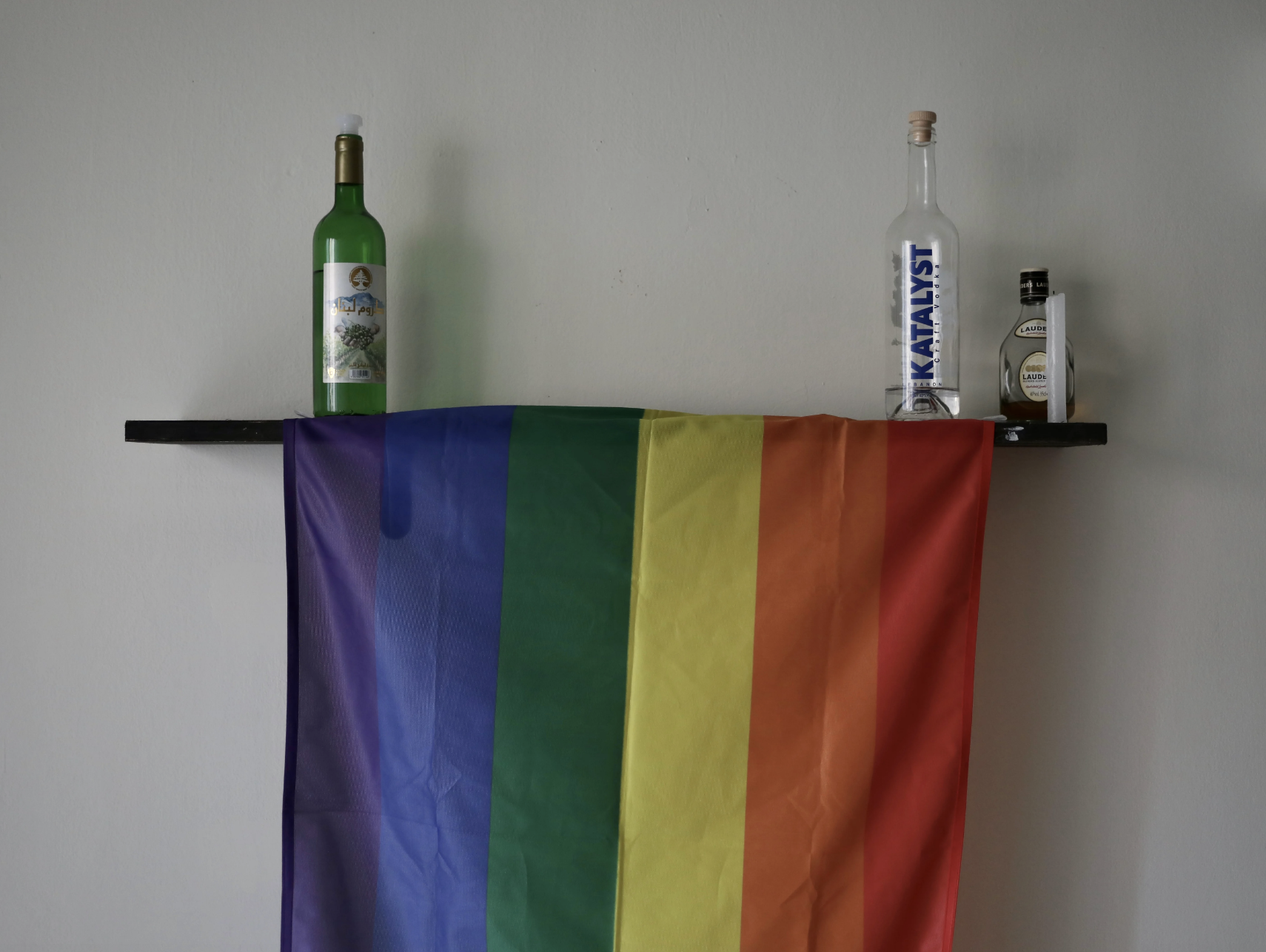 A rainbow flag hangs in the minimalist living room of Ryan and Andy's Beirut apartment. (Credit: Matthieu Karam/L'Orient-Le Jour)
A rainbow flag hangs in the minimalist living room of Ryan and Andy's Beirut apartment. (Credit: Matthieu Karam/L'Orient-Le Jour)
Twenty-two days later, fearing that they would be stranded, the two young Iraqis turned back toward Kurdistan, where they remained in hiding because of problems with their papers.
“We stayed in a black-market hotel, surrounded by migrants,” Ryan said.
In addition to the fear of domestic violence, a new wave of homophobia convinced them that they had to leave the country at all costs.
On Dec.3, 2022, Moqtada Sadr, who had gone from militia leader to political leader and was still influential despite his withdrawal from political life six months earlier, launched a vast anti-LGBTQ campaign in his fiefdom of Madinat Sadr, calling for a million signatures to be collected “in support of the fight against the LGBTQ community” so that it “does not spread vice.”
A few days later, the Iraqi parliament dominated by the Coordination Framework — a bloc of pro-Iran Shiite parties fearful above all of Sadr’s ability to mobilize people — tabled a bill to “punish” anyone who “promotes homosexuality,” whether “in the state media, institutions, schools, universities, social networks, books, cinemas, theatres, publications and in public.” In other words, everywhere.
After trying in vain to get to Turkey, then Armenia, there was only one way out: Lebanon.
The same NGO that helped previously them financed their journey to Beirut, where they arrived on New Year’s Day with empty pockets and heavy hearts.
“We found a room for rent with a Lebanese man who turned out to be an alcoholic and a racist,” Ryan said. “After one night, he kicked us out after taking what was left of our money.”
That was the last straw for Andy.
“When we got here, it was harder than I thought. Past traumas were compounded by loneliness, housing difficulties, lack of money, and so on. All this led to a new, deep depression. At the end of January, I tried to kill myself,” Andy confided.
Andy survived. The two young Iraqis managed to find a flat to share, where they hang a queer flag and their few clothes.
Their minimalist interior is as much a testament to their hasty departure from Iraq as it is to their desire to leave their host country as quickly as possible.
“We know that the situation here is not good either: as foreigners who are members of the LGBTQ+ community, we are a prime target,” Ryan said.
At the end of 2022, the Helem association counted 4,007 violations recorded in 2021 in Lebanon against members of the LBGT+ community, including arrests, torture and blackmail perpetrated in particular by police.
Now, waiting impatiently for the UN refugee agency to give them an appointment, Ryan and Andy dream of a more distant exile, with no other horizon than to continue their flight.
*First names have been changed.
This article was originally published in French in L'Orient-Le Jour. Translation by Sahar Ghoussoub.
